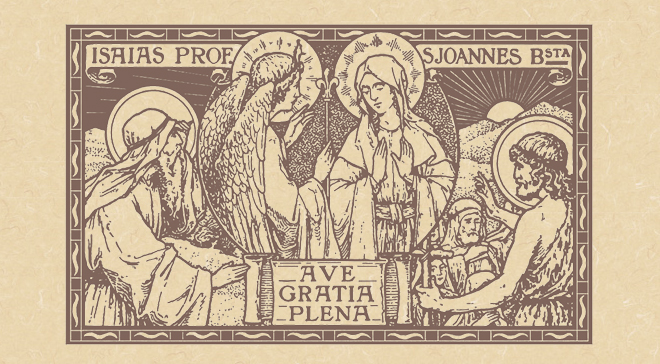You're Not the Only One Embarrassed by Your Family During the Holidays.
The Eighth Day Before the Nativity.*
Lessons from feria, according to the ordinary form of the Roman Rite:
• Genesis 49: 2, 8-10.
• Psalm 72: 1-4, 7-8, 17.
• Matthew 1: 1-17.
"O WISDOM, You came forth from the mouth of the Most High, and reaching from beginning to end, You ordered all things mightily and sweetly. Come, and teach us the way of prudence!"
FatherVenditti.com
|
 9:50 AM 12/17/2014 — The Mass for December 17th is always dreaded by priests because of the prospect of having to read all those peculiar names which no one can pronounce, the Gospel lesson for today being nearly the entire first chapter of Matthew’s Gospel; and, it’s very tempting to question whether the reading of the human genealogy of our Lord is necessary. What can hearing this list of names offer us that has any spiritual import? 9:50 AM 12/17/2014 — The Mass for December 17th is always dreaded by priests because of the prospect of having to read all those peculiar names which no one can pronounce, the Gospel lesson for today being nearly the entire first chapter of Matthew’s Gospel; and, it’s very tempting to question whether the reading of the human genealogy of our Lord is necessary. What can hearing this list of names offer us that has any spiritual import?
At the beginning of Advent I had mentioned how important the saints of the Old Testament, particularly the prophets, are to the observance of this season. For the Fathers of the Church, the Old Testament was an allegory of the new; and, today this is brought home for us in rather graphic detail: each one of these names has a meaning. There is a story in the Old Testament about every one of these people. And if we believe that the Gospel is the inspired word of God (which I’m sure we do), then God wants us to keep these names in mind. Matthew mentions them because he’s writing his Gospel to a primarily Hebrew audience; he wanted to show the Jews that Jesus was, in fact, the Messiah predicted in the Old Testament for the which the Hebrew people had been waiting. We read these names today because these names mean something just as important to us.
Break out your Old Testament and look up some of these people, and you’ll find that the human ancestors of our Lord were not all just and holy men. Among these names are sinners: those who committed incest, adultery, murder, apostasy; the names of Judas, of Tamar, of David and Ruth are filled with intrigue and calumny and horrific acts of despotism. Just take the one name of King David, who had a man named Uriah, a soldier of some distinction, sent to the front lines of a battle unprotected with the intention that he would be killed, because David lusted after this man’s wife. These were the human ancestors of our Lord. Our Lord wanted men such as these as His human ancestors; that is the mystery of the Incarnation: He wanted, on the human level, to be linked with all the muck and mud of man. He wanted to clear a way for Himself through the sins and crimes of humanity. After all, was that not the reason He came to earth as a man, to take upon His own back the sins of mankind?
And here is where the genealogy of our Lord is significant for each of us, for it is the history of each one of us that He takes upon Himself and overcomes. For each one of us has some of the features of our Lord’s less than sterling ancestors. In each one of us, either dormant or active, can be found the sins of the patriarchs and their children. There are never any new sins committed; only old sins with new faces. And just as Jesus once took upon Himself the flesh of a man and came into this imperfect world in order to heal and save it, so He also comes into our flesh—in the Blessed Eucharist—to heal and save us.
The danger, of course, is that we make the same mistake that our Lord’s own people made in failing to recognize that He is, indeed, who He claims to be. St. Matthew, no doubt, thought that, by beginning his Gospel with our Lord’s human genealogy, everyone would be convinced: that Jesus fulfills everything that the prophets of the Old Testament required of the promised Messiah. He was wrong. They weren’t convinced. The question is: are we? Do we recognize that the Eucharist we celebrate and receive is our Lord, God and Savior, Jesus Christ? Do we realize that our own happiness, both in this world and the next, depends upon following Jesus Christ as perfectly as we can? Are we put off the idea of trying to follow Jesus perfectly with the excuse that we’re not holy? Many of our Lord’s own human ancestors were not holy; that was the whole point. As our Lord Himself said to the Pharisees who criticized His association with sinners, “It is not the healthy who need the physician” (Mark 2: 17).

* From December 17th on, the ferial days before the Nativity all have their proper texts. They are sometimes called the days of the Greater Antiphons or "O Antiphons" after the antiphons sung or recited for the Magnificat at Vespers on these days, which may also be sung with the Alleluia at the verse before the Gospel at Holy Mass.
|

